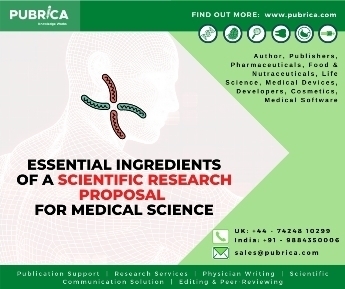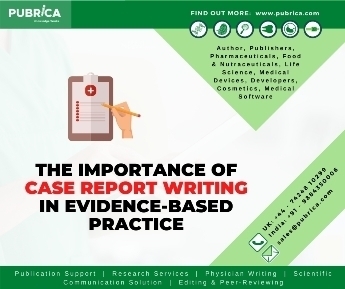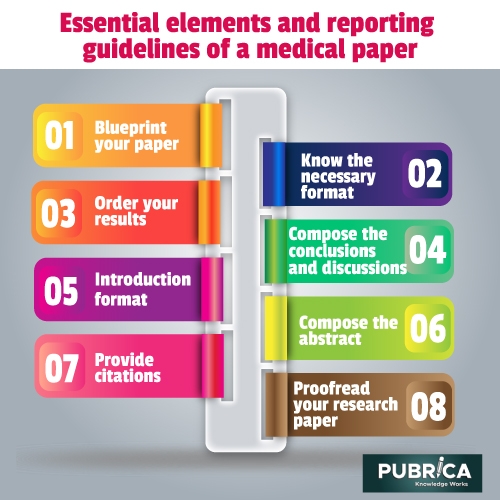
Essential Ingredients of a Scientific Research Proposal for Medical science
February 17, 2021
The importance of case report writing in evidence-based practice
February 24, 2021In-Brief:
- Taking the structure of the paper into concern is a good start. However, many particulars have to appear while writing.
- A paper regularly goes through several drafts before it is submitted. When revising a paper, it is useful to keep an eye out for the most common mistakes
- Pubrica explains the Essential elements and reporting guidelines of a medical paper and also provides regulatory writing services.
Introduction:
Once the research question is distinct, writing the paper becomes substantially easier. The research will ask the question, then answer it using medical writing solutions. The key to persuasive scientific writing is getting the structure of the paper right. A typical research paper’s basic structure (IMRAD) is the Introduction, Methods, Results, and Discussion sequence. Each section addresses a different objective.
- The problem they intend to address is given in the Introduction
- what they did to answer the question in the Methods section
- What observed in the Results section
- What they contemplate the results mean in the Discussion.
Essential elements and reporting guidelines of a medical paper
Blueprint your paper
Coordinate it such that bodes well and is not difficult to follow. Figure out what data fits best under each heading or segment and incorporate your sources as you go. Beginning with a diagram is additionally a simple method to start with the composition.
- Start with a list and afterwards include notes you’ve taken from references that help your thoughts.
- A basic approach to arrange research papers is to follow the IMRAD design. It directs your paper’s construction in the accompanying request: Introduction, Methods, Results, and Discussion.
- The diagram is only the fundamental design of your paper. Try not to stress if you need to rework a couple of times to take care of business.
- Ask others to investigate your framework and get input on the association.
- Know the crowd you are composing for and change your style as needs are.

Know the necessary format
Look into the rules and arranging prerequisites before you start. Every diary or award composing organization has diverse configuration necessities as to length and style. The size of your paper will presumably be pre-decided; however, focus on 10 – 20 pages except if educated unexpectedly.
- Use a standard textual style type and size, for example, Times New Roman 12 point text style.
- Double-space your paper.
- If necessary, make a cover page. Most institutions require a cover page or something to that effect. Incorporate your fundamental title, running title (frequently an abbreviated adaptation of your principle title), creator’s name, course name, and semester.
Order your results
Gap the paper into coherent areas dictated by the kind of writing you are creating. Meagre chances that it is a quantitative report, it needs to incorporate the sites referenced above (i.e., Hypothesis, Previous Findings, and so on). It is very less chance that it is a subjective report sorting out your paper into central matters that typically gain sense and ground from Medical Writing Companies.
- Break up data into areas and subsections and address one primary concern for every part.
- Include any figures or information tables that help your fundamental thoughts.
- For a quantitative report, express the techniques used to acquire results.
Compose the conclusions and discussions
Please mention to the peruser what you have discovered, why it applies to the field, and how future investigations could be dealt with additional this research. Try not to rehash data that has been expressed somewhere else in the Medical writing for clinical trials.
- State and sum up the central matters of your medical research paper.
- Discuss how this medical research adds to the field and why it is significant.
- Highlight likely uses of the hypothesis if proper.
- Propose future headings that expand upon the medical research you have introduced.
- Keep the Introduction and conversation short, and invest more energy clarifying the techniques and results
Introduction format
Compose the Introduction after the heft of your paper is finished to know what is essential to incorporate for the peruser to comprehend your paper. Acquaint your peruser with the subject of your medical research paper. Give fundamental foundation data, why you are composing this paper, and what they can expect because of understanding it.
- State why the issue is imperative to address.
- Discuss what is at present known and what is deficient in the field.
- State the goal of your paper.
- Keep the Introduction short.
Compose the abstract
An abstract sums up the article by featuring the central matters and permits the peruser to understand what your paper contains. Compose the academic last after you have completed the paper to sum up, all that you have expounded on appropriately.
- Highlight the motivation behind the paper, and the principle ends.
- State why your decisions are significant.
- Be brief in your synopsis of the paper.
- Show that you have a healthy report plan and a top-notch informational collection.
- Abstracts are typically one passage and between 250 – 500 words.
Provide citations
Referring to sources is a flat out must to evade copyright infringement and give others acknowledgement for their thoughts. Adding references while composing the paper is a lot simpler than burrowing through your sources toward the finish to figure out where a thought came.
- Unless coordinated, the American Medical Association (AMA) style manual for appropriately design references.
- Add references at the end of a sentence to demonstrate that you are utilizing another person’s thought. Utilize these all through your medical research paper, depending on the situation. They incorporate the creator’s last name, year of distribution, and the page number.
- Compile your reference rundown and add it to the furthest limit of your paper.
- Use a reference program on the off chance that you approach one to work on the cycle.
Proofread your research paper
You need to ensure that your paper is legitimately coordinated and streams well. It’s additionally essential to turn in the last draft liberated from any spelling and additionally linguistic blunders.
- Continually change your paper to ensure it is organized sensibly.
- Proofread your paper for spelling and linguistic mistakes.
- Make sure you are following the appropriate designing rules accommodated the paper.
- Have others read your paper to edit and check for clarity. Change on a case by case basis.
Conclusion:
A typical research paper’s basic structure (IMRAD) is the Introduction, Methods, Results, and Discussion sequence. Pubrica explains the Essential elements and reporting guidelines of a medical paper and provides medical writing consulting services.
References:
- Huth, E. J. (1986). Guidelines on authorship of medical papers. Annals of Internal Medicine, 104(2), 269-274.
- Nwogu, K. N. (1997). The medical research paper: Structure and functions. English for specific purposes, 16(2), 119-138.



